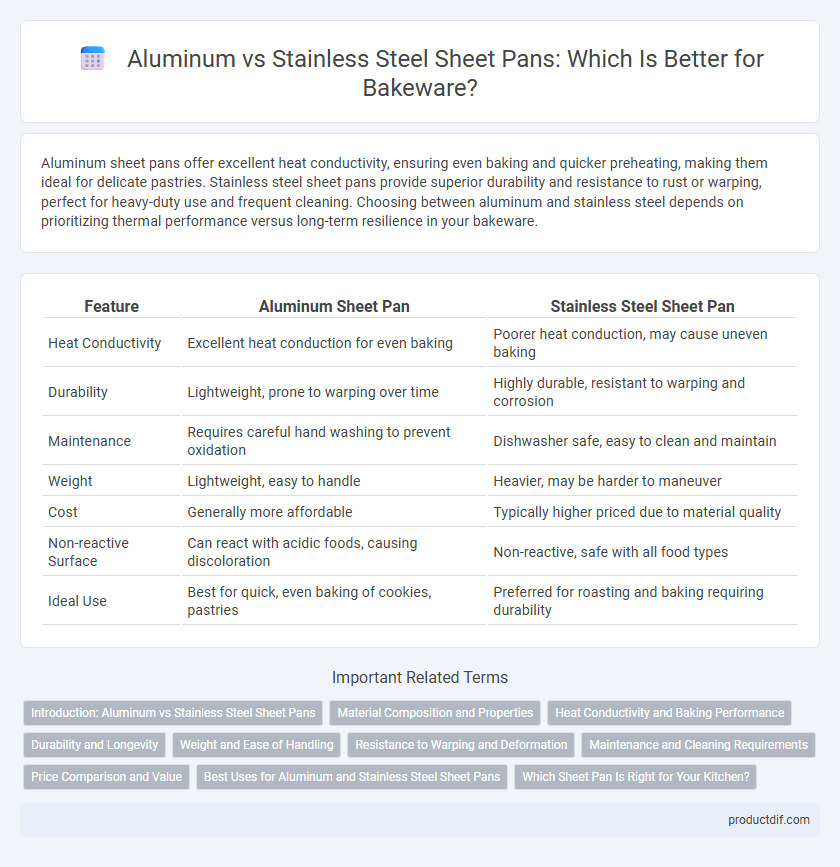Aluminum sheet pans offer excellent heat conductivity, ensuring even baking and quicker preheating, making them ideal for delicate pastries. Stainless steel sheet pans provide superior durability and resistance to rust or warping, perfect for heavy-duty use and frequent cleaning. Choosing between aluminum and stainless steel depends on prioritizing thermal performance versus long-term resilience in your bakeware.
Table of Comparison
| Feature | Aluminum Sheet Pan | Stainless Steel Sheet Pan |
|---|---|---|
| Heat Conductivity | Excellent heat conduction for even baking | Poorer heat conduction, may cause uneven baking |
| Durability | Lightweight, prone to warping over time | Highly durable, resistant to warping and corrosion |
| Maintenance | Requires careful hand washing to prevent oxidation | Dishwasher safe, easy to clean and maintain |
| Weight | Lightweight, easy to handle | Heavier, may be harder to maneuver |
| Cost | Generally more affordable | Typically higher priced due to material quality |
| Non-reactive Surface | Can react with acidic foods, causing discoloration | Non-reactive, safe with all food types |
| Ideal Use | Best for quick, even baking of cookies, pastries | Preferred for roasting and baking requiring durability |
Introduction: Aluminum vs Stainless Steel Sheet Pans
Aluminum sheet pans offer superior heat conductivity, ensuring even baking and faster preheating, making them ideal for cookies and pastries. Stainless steel sheet pans provide excellent durability and resistance to corrosion, often preferred for roasting and high-temperature cooking. Choosing between aluminum and stainless steel depends on cooking style, with aluminum favored for thermal performance and stainless steel for longevity and maintenance.
Material Composition and Properties
Aluminum sheet pans offer excellent thermal conductivity, ensuring even heat distribution and quick temperature response during baking. Stainless steel sheet pans are composed mainly of iron alloyed with chromium and nickel, providing superior durability, corrosion resistance, and non-reactive baking surfaces. While aluminum is lightweight and prone to warping under high heat, stainless steel maintains structural integrity but heats up more slowly, affecting baking consistency.
Heat Conductivity and Baking Performance
Aluminum sheet pans offer superior heat conductivity, ensuring even heat distribution and faster baking times, which enhances browning and texture. Stainless steel sheet pans conduct heat less efficiently, often requiring longer baking periods and potentially causing uneven cooking. For consistent baking performance, aluminum sheet pans are preferred due to their excellent thermal responsiveness and ability to prevent hotspots.
Durability and Longevity
Aluminum sheet pans offer excellent heat conductivity but are prone to warping and discoloration over time, reducing durability. Stainless steel sheet pans provide superior resistance to corrosion, denting, and warping, ensuring longer lifespan and consistent performance. For professional kitchens and heavy use, stainless steel offers unmatched longevity compared to aluminum alternatives.
Weight and Ease of Handling
Aluminum sheet pans are significantly lighter than stainless steel pans, making them easier to handle and maneuver during baking. Their lightweight nature reduces fatigue when lifting or moving multiple pans, ideal for busy kitchens or repetitive tasks. Stainless steel sheet pans, while heavier and more durable, can be cumbersome and may require more effort for handling but offer superior resistance to warping over time.
Resistance to Warping and Deformation
Aluminum sheet pans offer excellent heat conductivity but are more prone to warping and deformation under high temperatures or frequent use compared to stainless steel sheet pans. Stainless steel sheet pans provide superior resistance to warping and maintain their shape over time due to their robust, rigid structure. Choosing stainless steel ensures durability and consistent baking performance, especially for heavy or prolonged baking tasks.
Maintenance and Cleaning Requirements
Aluminum sheet pans require gentle hand washing with mild detergent to prevent oxidation and discoloration, avoiding abrasive scrubbers that can damage the surface. Stainless steel sheet pans offer superior durability and resist rust, making them dishwasher safe and easier to maintain with regular cleaning. Proper drying of both materials is essential to extend their lifespan and maintain optimal baking performance.
Price Comparison and Value
Aluminum sheet pans typically cost less than stainless steel sheet pans, making them a more budget-friendly option for both home bakers and professionals. Despite their lower price, aluminum pans offer excellent heat conductivity, ensuring even baking and quick temperature response, which provides substantial value for the cost. Stainless steel pans, while pricier, deliver superior durability, resistance to rust and warping, and long-term reliability, justifying their higher investment for frequent or commercial use.
Best Uses for Aluminum and Stainless Steel Sheet Pans
Aluminum sheet pans excel in quick, even heat distribution, making them ideal for baking cookies, roasting vegetables, and browning baked goods with consistent results. Stainless steel sheet pans offer superior durability and resistance to corrosion, making them suitable for high-temperature roasting and heavy-duty commercial baking where long-term sturdiness is essential. Selecting aluminum is perfect for delicate baking tasks requiring precise heat, while stainless steel is best for versatile cooking environments demanding strength and longevity.
Which Sheet Pan Is Right for Your Kitchen?
Aluminum sheet pans excel in even heat distribution and lightweight design, making them ideal for consistent baking and easy handling, whereas stainless steel sheet pans offer superior durability and resistance to rust and warping, suitable for high-temperature roasting and heavy-duty use. Choosing the right sheet pan depends on your cooking style: aluminum is perfect for delicate baked goods requiring precise heat control, while stainless steel suits versatile kitchen tasks requiring toughness and longevity. Consider factors like heat conductivity, maintenance, and budget to determine the best fit for your culinary needs.
Aluminum sheet pan vs Stainless steel sheet pan Infographic

 productdif.com
productdif.com